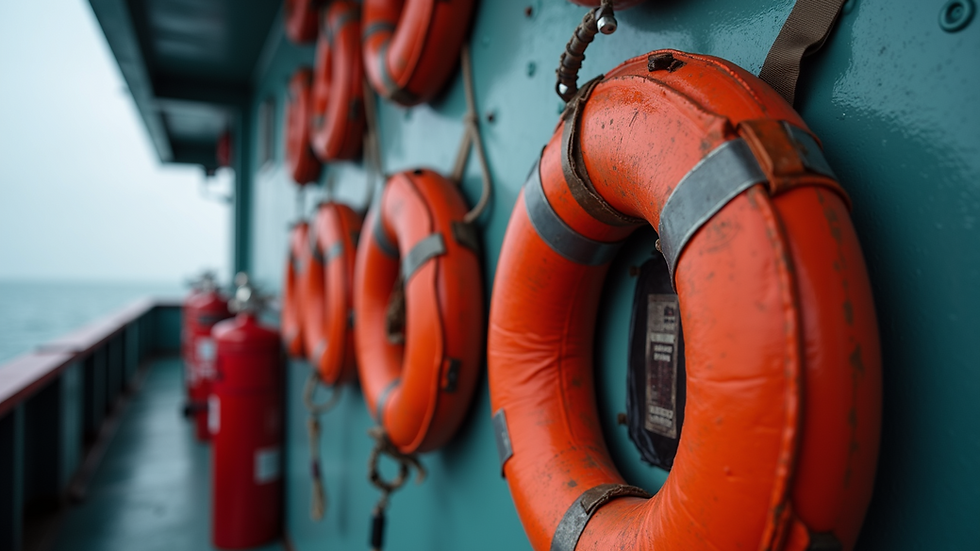Boosting Safety Standards for Fishing Vessels
- Sidonio Dos Santos
- Oct 27, 2025
- 4 min read
Fishing is more than a livelihood - it’s a way of life. But it can also be dangerous if safety is not a priority. I want to share some practical ways to boost safety standards for fishing vessels. Whether you’re navigating coastal waters or venturing further out, these tips will help protect you, your crew, and your investment.
Let’s dive into how you can make your fishing vessel safer, more reliable, and ready for the challenges of the sea.
Why Fishing Vessel Safety Tips Matter
Fishing vessels face unique risks. Rough seas, unpredictable weather, and heavy equipment all increase the chance of accidents. That’s why following fishing vessel safety tips is not just a good idea - it’s essential.
By improving safety standards, you reduce the risk of injury and loss. You also increase your vessel’s efficiency and lifespan. Plus, safe boats attract more business and support from the community.
For example, using locally-built aluminum boats designed for durability and stability can make a huge difference. These boats resist corrosion and handle rough waters better than traditional wooden vessels. This is exactly the kind of innovation MarineCraft Innovations (MACIN) is bringing to Timor-Leste’s coastal communities.
Safety is a shared responsibility. When everyone on board understands and follows safety protocols, the whole operation runs smoother. It’s about protecting lives and livelihoods.

Key Fishing Vessel Safety Tips to Implement Today
Let’s get practical. Here are some essential fishing vessel safety tips you can start using right now:
Regular Maintenance Checks
Inspect your vessel before every trip. Check the hull, engine, electrical systems, and safety equipment. Fix any issues immediately to avoid breakdowns at sea.
Proper Safety Gear
Equip your boat with life jackets, fire extinguishers, first aid kits, and emergency signaling devices. Make sure everyone knows where these items are and how to use them.
Crew Training
Train your crew on emergency procedures, navigation, and equipment handling. Regular drills build confidence and readiness.
Weather Monitoring
Always check weather forecasts before heading out. Avoid fishing during storms or rough seas.
Communication Devices
Have reliable radios or satellite phones on board. Staying connected can save lives in emergencies.
Load Management
Don’t overload your vessel. Distribute weight evenly to maintain stability.
Safe Navigation Practices
Use charts and GPS to avoid hazards. Follow local maritime rules and respect protected areas.
These tips are simple but powerful. They help you avoid common dangers and keep your fishing operations running smoothly.

What are the safety tips for boating?
Boating safety goes hand in hand with fishing vessel safety. Here are some additional tips specifically for boating that you should keep in mind:
Always Wear a Life Jacket
Even if you’re a strong swimmer, a life jacket can save your life in unexpected situations.
Avoid Alcohol
Alcohol impairs judgment and reaction time. Stay sober while operating the boat.
Keep a Float Plan
Inform someone onshore about your trip details - where you’re going and when you expect to return.
Know Your Boat’s Limits
Understand your vessel’s capacity and performance limits. Don’t push beyond them.
Stay Alert
Watch for other boats, swimmers, and obstacles. Maintain a safe speed.
Practice Man Overboard Drills
Know how to respond quickly if someone falls into the water.
By combining these boating safety tips with fishing vessel safety measures, you create a safer environment for everyone on board.

How MarineCraft Innovations Supports Safer Fishing Vessels
MarineCraft Innovations (MACIN) is changing the game for fishing vessel safety in Timor-Leste. They build strong, sustainable aluminum boats right here in the region. These boats are designed with safety and durability in mind.
Here’s how MACIN’s approach helps:
Locally Built for Local Conditions
Boats are tailored to handle Timor-Leste’s coastal waters, improving stability and reducing risk.
Sustainable Materials
Aluminum boats resist rust and damage, lowering maintenance needs and increasing reliability.
Job Creation and Skills Development
MACIN trains local workers, building expertise in marine manufacturing and safety standards.
Economic Growth
Safer boats mean more fishing opportunities and better income for coastal communities.
By choosing these innovative vessels, you’re investing in your safety and the future of your community.
Taking Action: Your Role in Fishing Vessel Safety
You might wonder - what can I do right now to boost safety on my fishing vessel? The answer is simple: start with small, consistent steps.
Inspect your boat regularly. Don’t wait for problems to appear.
Equip your crew with the right gear. Make safety a habit.
Learn and practice emergency drills. Confidence saves lives.
Stay informed about weather and sea conditions. Plan your trips wisely.
Consider upgrading to safer, locally-built boats. Support innovation and sustainability.
Remember, safety is not a one-time effort. It’s an ongoing commitment. When you prioritize safety, you protect your crew, your boat, and your livelihood.
If you want to learn more about fishing boat safety, check out MarineCraft Innovations’ blog for expert advice and updates.
Safety on the water is a journey, not a destination. By embracing these fishing vessel safety tips, you’re taking control of your future. Together, we can build a safer, stronger fishing community in Timor-Leste. Keep your boat seaworthy, your crew prepared, and your spirit adventurous. The sea is full of opportunity - let’s make sure everyone comes home safe.




Comments